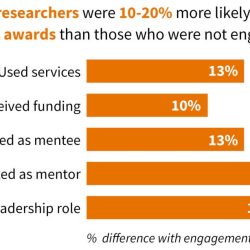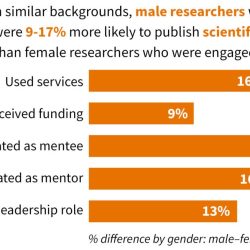If you build it, will they come? When it comes to engaging scientists, a new study says that if you fund it, they will.
A team of researchers that has been evaluating the Washington University Institute for Clinical and Translational Sciences (ICTS) since 2010 has released new findings. They suggest that CTSA member researchers who engaged with dedicated ICTS infrastructure and resources increased their research productivity; members who took advantage of ICTS services were more likely to publish articles and submit and receive grants than those who did not.
The National Institutes of Health and its National Center for Advancing Translational Sciences (NCATS) launched the CTSA Program in 2007 to support creating program infrastructure to promote collaboration among scientists and improve translational research. NCATS currently funds about 60 CTSA hubs in the US, including the Washington University ICTS. Translational science is research that results in real-world change, for example, improvements in practice, professional guidelines, or delivery of health and social services.

While most evaluations of these types of programs focus on increases in publications or grants, few examine how or why this happens, and how putting in place additional infrastructure can help researchers provide greater community benefit. Authors of the new study, published in the Journal of Clinical and Translational Science, looked at researcher engagement with the ICTS across four categories: using core services; receiving ICTS internal project funding; participating in mentor-mentee opportunities; and serving in leadership roles. The results were notable: engaged researchers were 10-20% more likely to receive grant awards than those who were not engaged.

The study also explored differences in productivity by gender, finding that across all types of engagement, male researchers were more productive than female researchers with the same rank and experience. According to lead author, Todd Combs, PhD, assistant professor at the Brown School and associate director of the Center for Public Health Systems Science, “Even when women engage with available services and support, their productivity is less than that for men, illuminating the need for more efforts focused on understanding and overcoming barriers to academic success among women.”
Bradley Evanoff, MD, MPH, the Richard A. and Elizabeth Henby Sutter Chair in Occupational, Industrial, and Environmental Medicine, former director of the Washington University ICTS and co-author on this study, noted the importance of this study in unpacking the ‘black box’ of how new services, resources, and opportunities, can increase productivity. “Keeping decision-makers aware of the outcomes of these investments is crucial to secure future research funding, reduce disparities, and decrease the time-to-uptake of new translational science findings,” Evanoff said.
